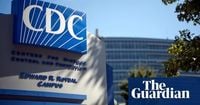In a significant shakeup at the Centers for Disease Control and Prevention (CDC), Dr. Fiona Havers, who led the agency's Respiratory Virus Hospitalization Surveillance Network (RESP-NET), resigned on Monday, June 16, 2025. Her departure comes amid growing concerns about the integrity of data use in vaccine policymaking under the leadership of Health and Human Services Secretary Robert Kennedy Jr.
Dr. Havers, a key figure in tracking hospitalization trends for infectious diseases such as COVID-19, respiratory syncytial virus (RSV), and influenza, expressed serious doubts about how the data her team collected would be utilized. In an email to colleagues, she stated, "I no longer have confidence that these data will be used objectively or evaluated with appropriate scientific rigor to make evidence-based vaccine policy decisions." This resignation marks a profound moment of protest within the CDC, highlighting tensions over the agency's scientific processes.
Havers’ work with RESP-NET has been pivotal in shaping vaccine recommendations. Her team’s data has underpinned more than 20 peer-reviewed manuscripts and 15 Morbidity and Mortality Weekly Reports issued by the CDC. She took pride in how COVID-NET and RSV-NET hospitalization data influenced vaccine policy, noting these findings were presented at nearly every public Advisory Committee on Immunization Practices (ACIP) meeting since 2020.
However, recent developments have rattled the usual order. In an unprecedented move earlier this year, Secretary Kennedy bypassed the traditional ACIP process to implement his own vaccine policy changes. In late May, he narrowed COVID-19 vaccine guidance to exclude healthy children and pregnant women without underlying health conditions, sidestepping an ongoing ACIP review. Then, in June, Kennedy fired all 17 members of the CDC's independent vaccine advisory panel in what he described as a "clean sweep." He also dismissed staff responsible for overseeing the panel's vetting and agenda.
This drastic overhaul sparked alarm within the scientific community. The ousted ACIP members, in a viewpoint published in the Journal of the American Medical Association on the day of Havers' resignation, condemned Kennedy's actions. They warned that dismantling the established vaccine recommendation process could roll back critical immunization achievements and jeopardize public health. "As former ACIP members, we are deeply concerned that these destabilizing decisions, made without clear rationale, may roll back the achievements of US immunization policy, impact people's access to lifesaving vaccines, and ultimately put US families at risk of dangerous and preventable illnesses," they wrote.
Following their dismissal, Kennedy appointed a new advisory panel comprising eight members, many of whom are known allies of the health secretary and critics of COVID-19 vaccines or vaccines in general. This new committee is scheduled to convene from June 25 to 27, 2025, to vote on updated vaccine recommendations for COVID-19 boosters, RSV, and other diseases.
The upheaval extends beyond personnel changes. Kennedy's decision to drop the recommendation for COVID-19 vaccination among healthy children and pregnant women has raised eyebrows. This move contrasts sharply with previous CDC guidance, which relied heavily on data presented by Havers and her team.
Within the CDC, Havers' resignation is seen as part of a broader pattern of "dismantling" the agency's expertise, according to an infectious disease researcher familiar with her concerns. The researcher, speaking on condition of anonymity, described the loss as significant: "It's a big loss to the CDC." Despite requests for comment, the CDC did not respond directly to inquiries about the situation.
Instead, Emily Hilliard, a spokesperson for the Department of Health and Human Services (HHS), defended the agency's approach. She stated, "Under Secretary Kennedy's leadership, HHS is committed to following the gold standard of scientific integrity. Vaccine policy decisions will be based on objective data, transparent analysis, and evidence – not conflicts of interest or industry influence." This assertion comes amid widespread scrutiny of the department's handling of vaccine policy and the recent restructuring of advisory panels.
The controversy highlights the delicate balance between scientific integrity and political oversight in public health decision-making. The CDC's vaccine recommendations carry significant weight, as they influence federal policies that govern vaccine access, liability protections, and insurance coverage. The traditional ACIP process, involving expert deliberation and voting, has been a cornerstone of this system for decades.
By unilaterally altering vaccine guidance and reshaping the advisory committee, Secretary Kennedy has disrupted a process that many in the medical community view as essential to maintaining public trust and effective immunization strategies. The upcoming meeting of the new ACIP panel will be closely watched, as it will set the tone for future vaccine recommendations amid ongoing debates about COVID-19 and other respiratory illnesses.
Dr. Havers’ resignation underscores the challenges facing the CDC and the broader public health infrastructure at a time when infectious diseases continue to pose significant threats. Her concerns about the objective use of data and scientific rigor reflect broader anxieties about the politicization of health policy.
As the new advisory committee prepares to meet, the nation faces critical decisions about vaccine strategies that will impact millions. The departure of a respected scientist like Dr. Havers signals the stakes involved and the importance of preserving scientific standards in public health governance.




